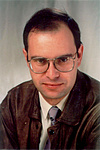CD Laboratory for Laser-Assisted Diagnostics
Head of research unit

Commercial Partner
Duration
01.12.2013 - 30.11.2014
Thematic Cluster

The research interest lies in application-oriented basic research in the field of laser-assisted procedures. These methods are analysed and further developed with regard to material diagnostics. New methods for analysing highly complex composite materials are developed and applied.
As part of the research activities, detailed knowledge and a precise understanding of the physical and chemical interaction mechanisms in laser processes are being developed. The focus is on the question of how intense laser light reacts with highly complex composite materials consisting of different chemical elements and phases. For such material classes, the interaction of laser light with material has not yet been sufficiently investigated. Additional effects caused by impurities or enveloping materials must also be taken into account.
Based on these investigations, completely new laser methods are being developed that allow the compositions of such technical and industrial materials to be analysed. When using these methods, small amounts of the material to be analysed are ablated in a first step - without any sample preparation - using laser ablation. For this purpose, the material is rapidly heated using pulsed lasers with high pulse energy until plasma is formed on the surface, which is then analysed. The advantage of such material ablation is that there is no damage to the unirradiated material and no separation of the material components.
The plasma is examined directly on site to characterise the material. Optical or other methods are used, such as mass spectroscopy (method for measuring the mass of atoms or molecules). The chemical composition of the material can be analysed without material contact and directly during the removal process.
Thanks to the research work, extremely efficient laser-assisted processes are being developed that enable a faster response to changes in the process and a precise classification of materials. In a further development, these processes can be used "inline", e.g. directly in industrial production. Last but not least, the focus is also on short-pulse lasers, which enable even more sensitive detection methods.
Overall, these new methods will also be useful for quality control and analysing waste for efficient recycling.

Christian Doppler Forschungsgesellschaft
Boltzmanngasse 20/1/3 | 1090 Wien | Tel: +43 1 5042205 | Fax: +43 1 5042205-20 | office@cdg.ac.at

